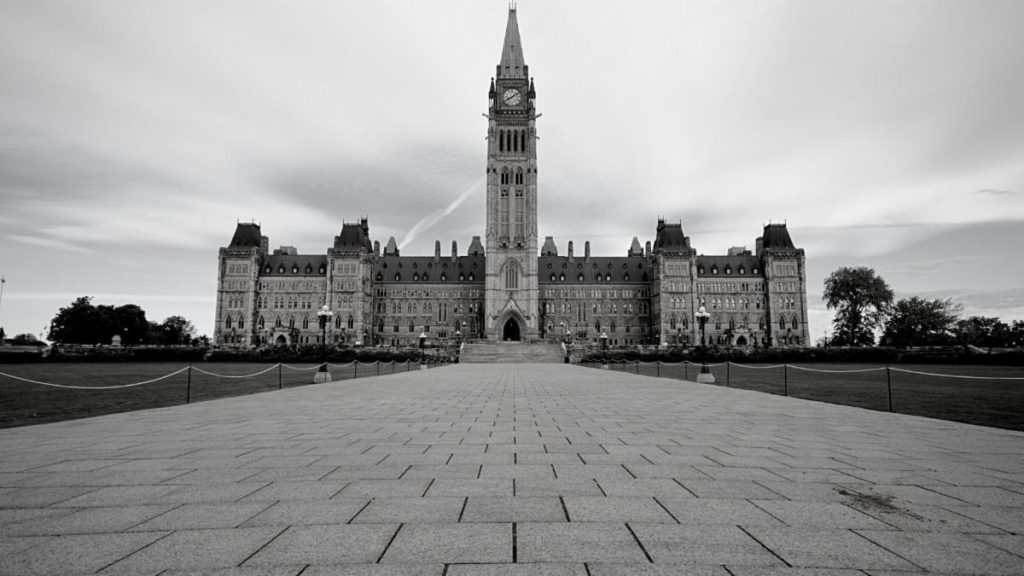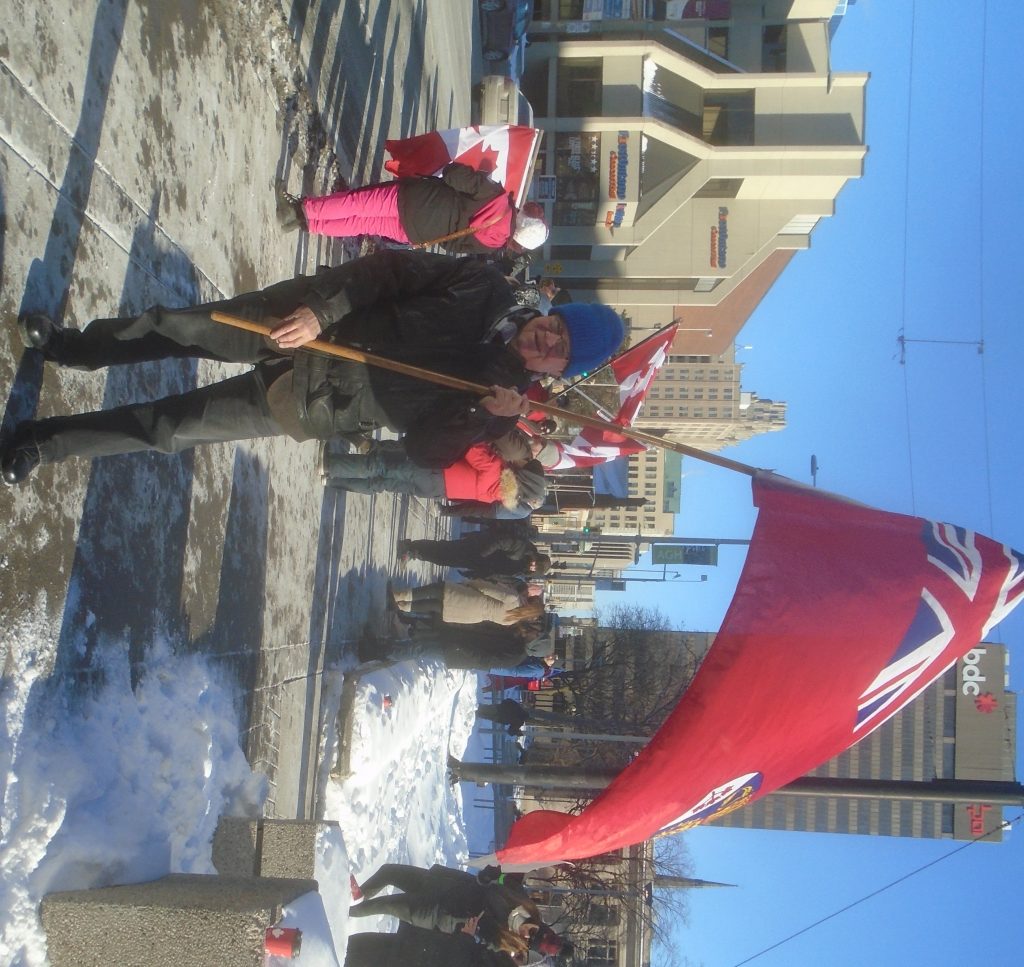Christine Van Geyn
Litigation Director
Canadian Constitution Foundation
cvangeyn@theccf.ca
TO: The Standing Committee on Justice and Human Rights
RE: Canadian Constitution Foundation brief on Bill C-9, An Act to amend the Criminal Code
(hate propaganda, hate crime and access to religious or cultural places)
November 4, 2025
The CCF
The Canadian Constitution Foundation (“the CCF”) has prepared this brief to outline our
concerns with Bill C-9, An Act to amend the Criminal Code (hate propaganda, hate crime and
access to religious or cultural places).
The CCF is a non-partisan charity dedicated to defending Canadians’ rights and freedoms
through education, communications and litigation. The CCF is involved in dozens of cases per
year in defence of the constitution. The CCF has been involved in landmark cases involving
freedom of expression, including Saskatchewan v Whatcott, 2013 SCC 11, and Ward v Quebec,
2021 SCC 43. The CCF successfully challenged the invocation of the Emergencies Act in February
2022, where the Federal Court found the invocation was ultra vires and the regulations violated
the Charter of Rights and Freedoms’ protections of expression and security against
unreasonable searches and seizures. The decision remains under appeal. The CCF also offers
free online courses for members of the public, including courses on the fundamentals of
Canada’s constitution and a course on freedom of expression. I have co-written three books that
discuss free expression: Pandemic Panic, Free Speech in Canada and Maple’s Garden.
The CCF’s concerns
Bill C-9 proposes major changes to Canada’s hate propaganda regime. These changes will lead
to more people being investigated, charged, and prosecuted for their words. Hate against
people is wrong, and our society must confront hate and condemn it. But the criminal law is not
the right tool for every social scourge. The criminal law comes with a loss of liberty, and our
highest level of social stigma. Expanding the possibility of putting people in prison for their
words, or even being labelled hate propagandists, also risks capturing speech that may merely
offend. The scope of debate on controversial topics of public importance will be limited and
chilled if the threat of criminal sanction is expanded and looms over our civil discourse.
The Charter right to freedom of expression guaranteed in section 2(b) protects all speech,
including speech that offends, and even hate speech. The guarantee is content neutral. The
question before the courts in cases involving extreme speech is always about when limits can be
Page 1 of 7
Christine Van Geyn
Litigation Director
Canadian Constitution Foundation
cvangeyn@theccf.ca
imposed on speech, not whether speech is protected. To ensure the widest possible scope of
debate and the search for truth, it is vital that the threshold for criminal sanction of speech is
high. Bill C-9 would lower this threshold, remove safeguards against politically motivated
charges, remove political accountability for charges, would create a risk of overcharging to force
plea bargains, expand the availability of hate offences beyond the criminal law, and risks limiting
constitutionally protected protest activity.
Canadians are not safer when we do not know what people believe. The criminal law can never
remove hate from an individual’s heart. Instead, the criminal law should be oriented towards
doing what it can do: restricting violence and threats of violence, which includes intimidation,
harassment, and blockading. The concept of hatred is subjective, and when opinion is
criminalized, we make martyrs out of hatemongers and draw more attention to their vile
viewpoints. Criminalizing opinion forces hateful speech underground and online, where
individuals can get trapped in cycles of radicalization, and where hateful ideas are not
confronted with the truth. In the end, as John Stuart Mill warned in his famous defence of free
speech in On Liberty, suppressing opinions prevents the exchange of error for truth, and
deprives us of the clearer and livelier perception of the truth that comes from its collision with
falsehood.
The primary duties of Parliament are to represent the electorate, hold the executive
accountable, and uphold Canada’s constitutional democracy. Parliament has an obligation to
ensure laws it passes are in keeping with our constitution, including our constitutional
protection for freedom of expression. Some of the proposals in Bill C-9 are very likely unjustified
violations of this protection, guaranteed by the supreme law of Canada. Others are unnecessary
because they are redundant in light of Canada’s existing laws.
Accordingly, the CCF’s primary recommendation is to withdraw Bill C-9.
In the alternative, the CCF proposes six amendments that could reduce, though not eliminate,
the risk that C-9 unjustifiably violates freedom of expression.
Amendment 1: The definition of hate in Bill C-9 must exactly track the case law.
The Criminal Code prohibits the public incitement of hatred in section 319(1) and the wilful
promotion of hatred in section 319(2).
Public incitement of hatred prohibits the communication of a statement in public that incites
hatred against any identifiable group where such incitement is likely to lead to a breach of the
peace.
Page 2 of 7
Christine Van Geyn
Litigation Director
Canadian Constitution Foundation
cvangeyn@theccf.ca
Wilful promotion of hatred prohibits communicating statements, other than in private
communication, that wilfully promote hatred against an identifiable group.
If Parliament wishes to provide a statutory definition of “hatred” for offences in section 319 of
the Criminal Code, this statutory definition must precisely track the definition that has been
outlined by the Supreme Court as high enough to protect freedom of expression.
In R v Keegstra, [1990] 3 SCR 697, the majority of the Supreme Court held that “the term
‘hatred’ connotes emotion of an intense and extreme nature that is clearly associated with
vilification and detestation.” The court in Keegstra warned that there is a danger that a court
may improperly infer hatred from statements he or she personally finds offensive. This is why
the court recognized the need to circumscribe the definition of “hatred” in such a precise
manner.
In R v Andrews, [1990] 3 SCR 870, Cory J.A. stated that: “Hatred is not a word of casual
connotation. To promote hatred is to instil detestation, enmity, ill-will and malevolence in
another. Clearly an expression must go a long way before it qualifies within the definition in [s.
319(2)].”
More recently, in Saskatchewan v Whatcott, 2013 SCC 11, the Court reiterated that: “…the
legislative term “hatred” or “hatred or contempt” is to be interpreted as being restricted to
those extreme manifestations of the emotion described by the words “detestation” and
“vilification”.” This filters out expression which, while repugnant and offensive, does not incite
the level of abhorrence, delegitimization and rejection that risks causing discrimination or other
harmful effects” (emphasis added).
In Whatcott, Justice Rothstein struck down a Saskatchewan provision that outlawed speech that
“ridicules, belittles or otherwise affronts the dignity of” protected groups because that
definition of hatred “could capture a great deal of expression which, while offensive to most
people, falls short of exposing its target group to the extreme detestation and vilification which
risks provoking discriminatory activities against that group” (emphasis added).
The definition of hatred laid out in C-9 is a lower threshold than that set out in Keegstra.
Section 319(7) of -9 defines hatred as “the emotion that involves detestation or vilification and
that is stronger than disdain or dislike” (emphasis added).
The proposed definition removes the requirement that the speech be the “intense and
extreme”, and now merely requires that the emotion “involve” detestation or vilification rather
Page 3 of 7
Christine Van Geyn
Litigation Director
Canadian Constitution Foundation
cvangeyn@theccf.ca
than be “clearly associated” with detestation and vilification. It also lowers the standard by
defining hate as the emotion associated with detestation “or” vilification, rather than
detestation “and” vilification.
While the Minister of Justice has suggested that the intention of the bill is to reflect the case law
and paraphrase the words of the court, the most important aspect of the law, if passed, that a
future court will consider is the actual text. The intention of the Minister will likely be argued,
but Parliament does not vote on the Minister’s statements: it votes on the text. If Parliament is
to legislate the definition of hatred, it risks violating constitutional rights if it departs from the
words the court has already upheld as constitutional limits on free expression.
Recommendation 2: Maintain the requirement for attorney general consent for hate crime
offences
Currently, any prosecution for a hate propaganda offence in section 319 of the Criminal Code
requires consent of the attorney general. This requirement is an important institutional
safeguard on the abuse of this especially sensitive provision of the Criminal Code.
Determining whether someone will face a prison sentence for the words they speak requires
political accountability, and charges require a careful balancing of the public interest and the
constitutional guarantee for freedom of expression.
There are serious risks associated with removing the requirement of attorney general consent,
including the risk of arbitrary, inconsistent, or selective enforcement based on political or
ideological grounds. It also risks charges that have no chance of conviction on the basis of
speech that offends the public. This risks chilling lawful political debate and dissent.
There is an additional concern that removing attorney general consent will allow for the
possibility of private prosecutions. While private prosecutions for criminal offences are rare in
Canadian law, the subjective nature of hatred combined with the current climate of political
polarization makes the risk of abuse of private prosecutions for this type of law especially
concerning.
Recommendation 3: Remove the standalone hate offence in proposed section 320.1001(1)
The law currently treats hatred as an aggravating factor at the sentencing stage. If an offence is
motivated by hatred, the sentencing judge can take that into account and impose a more
serious sentence. This should not be changed.
Page 4 of 7
Christine Van Geyn
Litigation Director
Canadian Constitution Foundation
cvangeyn@theccf.ca
Bill C-9 proposes the creation of new standalone hate crime offences that layer on top of
another offence. And this is not confined to criminal law. Bill C-9 proposes that everyone who
commits an offence contrary to any act of Parliament that is “motivated by hatred” is guilty of a
separate offence.
This dramatically expands criminal liability. It could make quasi-criminal or even regulatory
offences criminal offences if they are “motivated” by hatred. This approach is duplicative
punishment for criminal offences, and it risks transforming non-criminal offences into criminal
offences that carry with them terms of imprisonment and the social stigma of the criminal law.
By creating the possibility of a duplicate offence with high penalties, Bill C-9 creates a risk of
overcharging. Crowns, no longer constrained by the requirement of attorney general consent,
may pressure defendants to plead guilty by layering the threat of more serious hate charges on
top of other criminal – or even quasi-criminal – charges. Hatred should remain a sentencing
consideration.
Recommendation 4: Remove the prohibition on “hate symbols”
Bill C-9 makes it an offence to wilfully promote hatred by displaying listed hate symbols,
including the Nazi Hakenkreuz, or hooked-cross1, the Nazi double Sig-Rune, also known as the
SS bolts, as well as symbols that are “principally used by, or principally associated with” listed
terrorist organizations.
To be clear, the display of these symbols to wilfully promote or incite hatred are despicable. But
the proposal in Bill C-9 is flawed for at least four reasons.
First, Canadians are not made safer if we do not know that someone down the street from our
home holds racist and evil views. We are better off knowing who holds disturbing opinions so
that we can openly confront those viewpoints, or stay away from such people. Every year our
newspapers feature at least one story about a local crank flying a Nazi symbol. And every year
we are reminded that these symbols, though horrible, are legal. Driving these symbols
underground through the criminal law grants them more power and mystique than they
deserve.
1 Bill C-9 calls this symbol the Nazi swastika, which is a common misnomer. The word swastika is a Sanskrit word for
an ancient and sacred symbol in Eastern religions like Hinduism, Buddhism, and Jainism.
Page 5 of 7
Christine Van Geyn
Litigation Director
Canadian Constitution Foundation
cvangeyn@theccf.ca
Second, the existing hate propaganda offences can already capture the use of symbols if those
symbols are used to wilfully promote or incite hatred. Under the current law, the display of
these symbols alone is not sufficient for a charge. Bill C-9 could change that. While the Minister
has suggested that this provision is intended to supplement the existing wilful promotion of
hatred offence to place more emphasis on the use of hate symbols, the text leaves significant
room for interpretation. The text could easily be read to mean that the display of these symbols
on their own can now be grounds for an offence. And to reiterate, Parliament votes on the text
of the Bill, not on the intentions of the minister, and a court interpreting the law will look first at
the text.
Prohibiting the symbols alone would also capture too much expression. While it is distasteful,
foolish and inaccurate to compare any Canadian parliamentarians to Nazis or terrorists, we
often see these comparisons made by some disaffected citizens exercising their freedom of
expression. Some of these comparisons are made using these symbols, and this common type
of political speech could now be subject to criminal sanction.
There is also too much ambiguity in the text of the provision, as it would prohibit symbols that
are “principally used by” or “associated with” terrorist groups, or symbols that “nearly
resemble” the symbols of terrorist groups or that are “likely to be confused” with those
symbols.
Recommendation 5: Remove new provisions on intimidation
Bill C-9 would make it an offence to engage in any conduct with the intent to provoke a state of
fear in a person in order to impede their access to places of worship or cultural centres.
This provision is duplicative and can lead to confusion among law enforcement. The Criminal
Code already prohibits intimidation under section 423, harassment under section 264, and
mischief under section 420. Provincial highway traffic statutes also prohibit blockading roads.
When protests blockade roads or building entrances, police can already use these tools to
remove them. The rule of law requires the enforcement of the law, not the creation of new and
increasingly narrow laws when police fail to act.
Recommendation 6: Keep the defences of truth and good faith religious opinion in section
319(3)
Page 6 of 7
Christine Van Geyn
Litigation Director
Canadian Constitution Foundation
cvangeyn@theccf.ca
There has been some suggestion that the defences to hate propaganda offences in section
319(3) of the Criminal Code should be repealed. These defences provide that no person shall be
convicted of wilful promotion of hatred if the statements were true or were a good faith
expression of an opinion on a religious subject or based on a belief in a religious text.
These defences must be maintained.
The courts have considered the religious belief defence in 319(3), and the existence of this
defence has been core in the analysis that found the offence of wilfully promoting hatred to be
a justified limit, in for example, Keegstra. Removing this defence would open up the legislation
to a new constitutional challenge. It is also worth noting that there has never been an instance
where the defence was argued successfully.
The courts have interpreted the defence as a narrow one, and found that it does not operate so
as to shield speech that wilfully promotes hatred merely because it is embedded with religious
language. The court in R v Harding, 2001 CanLII 21272 (ON CA) held that: “Although expression
of religious opinion is strongly protected, this protection cannot be extended to shield this type
of communication simply because they are contained in the same message and the one is used
to bolster the other. If that were the case, religious opinion could be used with impunity as
a Trojan Horse to carry the intended message of hate forbidden by s. 319.”
Removing the religious defence, combined with removing the requirement for attorney general
consent, would lead to investigations and charges based on good faith but misunderstood
religious dialogue, and would inevitably lead to a chill on religious debate or even good faith
political debate on moral topics out of fear of severe criminal sanction.
Page 7 of 7










